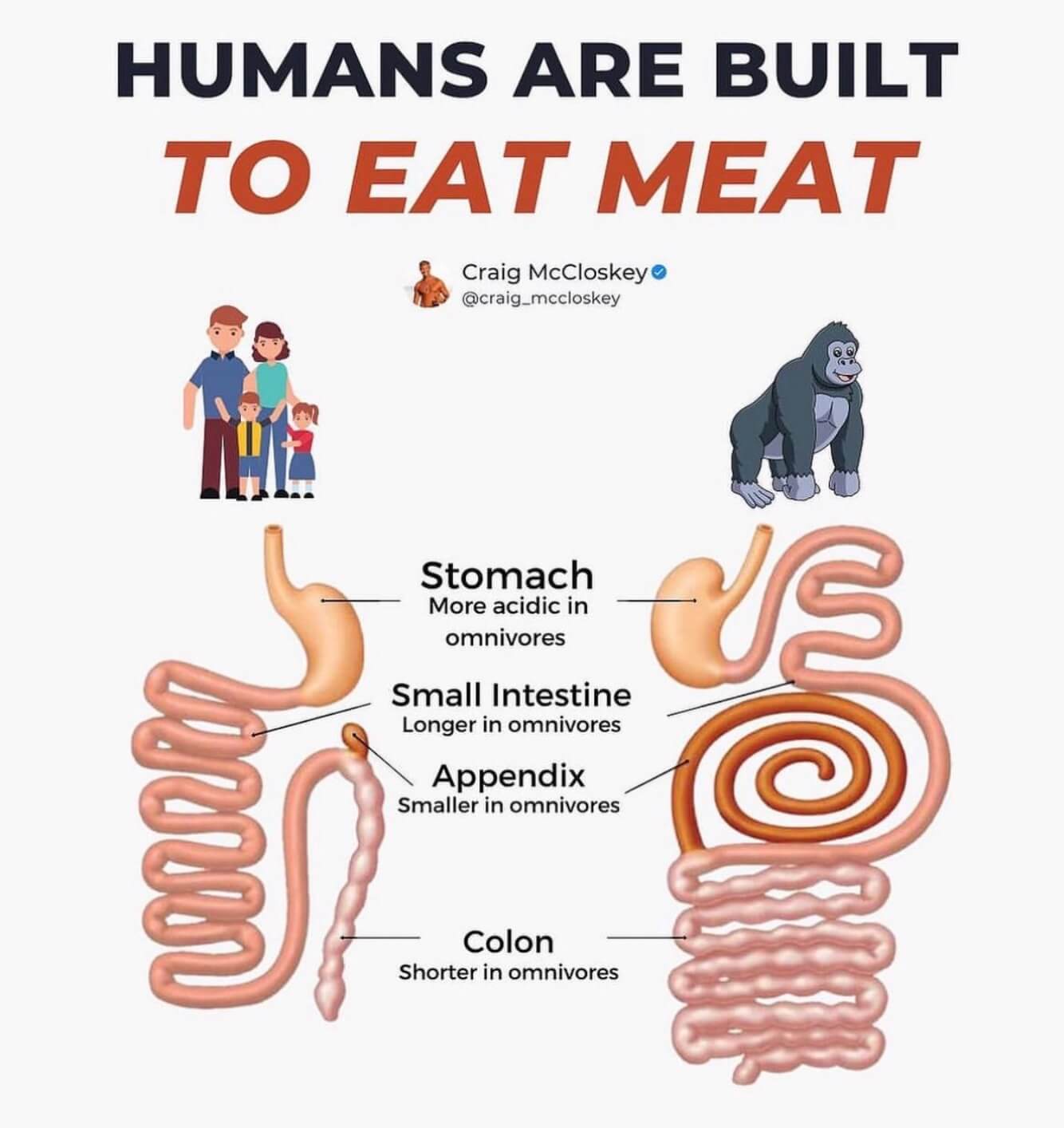Many people who follow an animal-based diet wonder how to consume enough fiber, which is supposed to be an essential factor for maintaining a healthy gut microbiome, supporting regular bowel movements, and avoiding constipation (among other alleged health benefits).
In this article, I’ll explain everything you need to know about the role fiber plays (or more accurately, doesn’t play) in a well-designed carnivore diet.
Key Takeaways
- Humans don’t need fiber to maintain optimal (gut) health. While that might sound shocking, there is no credible scientific evidence to suggest that consuming fiber offers any meaningful health benefits. Additionally, you don’t need to consume fiber to have regular bowel movements.
- Consuming fiber increases stool volume and slows down digestion. That’s often counterproductive if you suffer from irritable bowel syndrome (IBS) or similar gut issues.
- Fiber can improve your body’s blood sugar response. However, that’s irrelevant when following a meat-based diet, since meat doesn’t contain carbohydrates.
- Fiber doesn’t improve the bacterial composition of your gut (aka α-diversity). A meta-analysis of existing research has clearly shown that consuming fiber does not improve the diversity of microbial species within the gut microbiome.
- Early humans and our Paleolithic ancestors didn’t consume meaningful amounts of fiber. Neither early humans nor modern hunter-gatherer tribes like the Hadza in Tanzania consume fibrous plant foods. They might chew on them to extract some nutrients, but then they spit out the fibrous material because it’s indigestible.
- Consuming fiber doesn’t improve heart health, reduce the risk of cancer or support weight loss. Studies such as the this one have confirmed that increasing fiber in the diet (via more whole grains, fruits and vegetables) had no beneficial effect on colon cancer, nor did it prevent heart disease or cancer or induce weight loss.
- Eating fiber makes you fart more. A study published in the journal Nutrients in 2021 confirmed that men who consume a predominantly plant-based diet (i.e., a vegan diet) have increased “anal-gas evacuations.” I don’t know about you, but I don’t consider being bloated all the time and farting like a trumpet to be signs of good gut health.
The bottom line is that humans don’t need to consume fiber to reach or maintain optimal health, including gut health. As a result, you don’t have to worry about the lack of fiber in a meat-based or carnivorous diet consisting predominantly or exclusively of animal products, such as muscle meat, organs, fat or even raw dairy and pastured eggs.
While you could stop reading this article now and go back to eating a steak, let’s dive into some of the misconceptions and myths surrounding fiber you might run into when talking to others about the carnivore diet.
Fiber and Gut Health
There is a common misconception that your microbiota (i.e., your gut bacteria) need dietary fiber in the form of legumes, fruits and leafy greens to thrive.
The truth is that while consuming a high fiber diet can lead to an increase in certain bacteria in your stool (e.g., Bifidobacterium spp), research published in the American Journal of Clinical Nutrition shows that fiber does not improve the diversity of microbial species within the gut microbiome (also known as α-diversity), which is a key indicator of gut health.
However, studies have shown that consuming a lot of fiber makes you more bloated and causes you to fart more. Additionally, researchers at Harvard University found that following a meat-based diet does not reduce α-diversity.
In other words, from a microbiome standpoint, there is no advantage to choosing plants over meat.
Fiber and Bowel Movements
Most people who have been following a carnivore diet for a while can attest to the fact that it does not negatively impact bowel movements. This includes Dr. Shawn Baker, who has been on a strict carnivore diet for several years and talks about his experience in this YouTube video.
However, there are two important factors to keep in mind as you embark on a fiberless diet.
First, any sudden change to your dietary habits can temporarily impact your intestines and cause constipation. (And in rare cases, even diarrhea.) I recommend either cutting out plant foods and fiber slowly over the course of a few days or increasing your water, salt and magnesium intake to keep things moving along.
Second, if you eat only meat, you’ll produce less waste. In other words, you’ll poop less. Consuming plant foods increase stool volume because they contain a lot of waste the body can’t use. As a result, you might poop less or less frequently on an animal based diet, and some people mistake that phenomenon for constipation.
I can tell you from first-hand experience that I don’t need fiber in my diet to have regular bowel movements. I take a trip to the bathroom every morning like clockwork, even on days or weeks when I consume zero fiber. In fact, the less fiber I consume, the easier it is to clean my butt, thanks to the firm consistency of the stool.
Fiber and Cardiovascular Health

People with heart conditions or high blood pressure are often told by their doctors to increase their fiber intake because fiber is thought to improve heart health and lower the risk of cardiovascular incidents.
This myth was finally put to rest after scientists released the findings of an eight-year clinical trial involving 49,000 women, also known as the Women’s Health Initiative (WHI) Dietary Modification Trial.
As Alan Watson — a patient advocate, cardiovascular nutrition analyst, and author of 21 Days to a Healthy Heart and Cereal Killer, The Unintended Consequences of the Low-Fat Diet — put it:
“Results of the 49,000 Dietary Modification Trial (2006 Women’s Health Initiative) confirmed that increasing fiber in the diet (more whole grains, fruits & vegetables) had no beneficial effect on colon cancer, nor did it prevent heart disease or cancer or induce weight loss.”
— Alan Watson on X
The bottom line is that fiber doesn’t offer any meaningful health benefits when you’re on a carnivore diet. In other words, not consuming fiber won’t increase your risk of cardiovascular disease or other chronic diseases (and neither does dietary cholesterol and saturated fat).
You might be able to get away with consuming some fiber without experiencing negative side effects (I consume small amounts of seasonal fruits and avocados), but you definitely don’t have to go out of your way to consume fibrous plants.
Fiber and Weight Loss

Many people believe that consuming fiber can help you lose weight because it improves the body’s blood glucose response, slows down digestion, and fills you up with indigestible junk that doesn’t have any calories.
First of all, controlled trials like the Women’s Health Initiative have shown that increased fiber intake does not induce weight loss.
More importantly, one of the benefits of the carnivore diet is that it has zero carbs, which means that consuming meat doesn’t trigger a spike in blood sugar. That makes any of the potential blood-sugar-lowering benefits of fiber irrelevant.
Additionally, following a zero or low-carb ketogenic diet that’s centered around animal products (such as the carnivore diet), is incredibly satiating while providing all of the essential amino acids and short-chain fatty acids your body needs to maintain muscle tissue, ensure optimal cell structure, make hormones and maintain optimal gut health.
If you add in organ meat — such as liver, heart, spleen, bone marrow or kidneys — you also get all of the essential micronutrients to maintain optimal health. If you don’t like the taste or texture or organ meat, consider using freeze-dried beef organ supplements, such as the ones we sell over at MK Supplements.
If you’re primarily concerned about fiber intake because you’re looking to shed some unwanted pounds, I recommend you read my article on the best diets for weight loss, which explains in detail why following a carnivore diet is a better choice than opting for plant-based foods.
Carnivore-Friendly Sources of Fiber

If you’ve read this far and are still looking for sources of fiber that are compatible with a carnivore diet — maybe because you’re trying to heal your gut — I have good news for you.
Certain types of dairy contain special prebiotic carbohydrates known as oligosaccharides. While oligosaccharides aren’t exactly the same as plant fibers, they can have a comparable effect.
The types of dairy that are most likely to contain oligosaccharides include:
- Aged cheeses. The aging process involves fermentation, during which the bacteria in the cheese can produce oligosaccharides. Examples include aged cheddar, Parmesan, and gouda.
- Cheeses made with probiotic bacteria. Some cheeses are specifically made with probiotic strains of bacteria that can produce oligosaccharides. These are often marketed for their gut health benefits.
- Raw milk cheeses. Cheeses made from raw milk may retain more of the naturally-occurring oligosaccharides found in milk, because pasteurization can break down some of those compounds. Just note that many of the raw cheeses found in grocery stores are heated during the cheese making process, thus effectively pasteurizing them.
- Human milk oligosaccharides (HMOs). It’s also worth noting that human milk is a rich source of unique oligosaccharides called human milk oligosaccharides (HMOs). While not found in cheese, they are an example of oligosaccharides in a dairy product (human breast milk).
Additionally, it’s worth noting that there are other animal-based foods you can consider to heal your gut, including:
- Fermented dairy products, such as kefir or buttermilk. I regularly make raw milk kefir at home and enjoy a glass with breakfast.
- Bone broth. Rich in collagen and other nutrients, bone broth can help heal the lining of your gut and improve your overall gut health.
- Bovine colostrum. As discussed in my article about the benefits of bovine colostrum, first milk is loaded with gut-healing micronutrients, including enzymes and growth factors. You can use one of these high-quality colostrum supplement powders to add it into your diet.
- Beef intestines and digestive organs. Beef organs, including the intestines and the pancreas, contain all the micronutrients your gut needs to heal. That’s one of the reasons why we decided to add pancreas to our Beef Organs supplement.
However, it’s worth noting that most people can heal their gut by just removing all plant foods from their diet. That’s how I healed my irritable bowel syndrome (IBS) in less than two weeks.
Why Humans Do Better Eating Meat

To start, let’s be clear that humans aren’t herbivores. We don’t have a rumen to ferment plant foods and turn fibrous materials into amino acids and fatty acids like ruminant animals (e.g., cows). We also don’t have a large cecum like horses or rabbits to store and digest plant matter.
Additionally, unlike herbivores, humans have a fairly acidic stomach (ideal for digesting animal foods and killing pathogens), a relatively long small intestine (again, ideal for digesting animal products), and a relatively short large intestine (for digesting plant foods).
We also don’t have the right type of bacteria in our large intestine to break down fiber and turn it into protein or fat (like ruminants do). And we don’t possess any of the enzymes ruminants have to neutralize and break down the many defense chemicals found in plants (aka antinutrients). Check out my article comparing meat vs. plants to learn more about antinutrients and their negative impact on our health.
So as you can see, humans are poorly designed to digest plant matter, even though we have retained some capacity to do so. After all, we do have molars in addition to canines, incisors to chew plant food, and a large intestine to digest some of it.
As a result, it really shouldn’t come as a surprise that you don’t need fiber on a well-designed carnivore diet consisting of responsibly-raised animals, wild-caught seafood and raw dairy.
Final Thoughts: Don’t Worry About Fiber On A Carnivore Diet

If you’re following a standard American diet (SAD) or a similar high-carb diet, you could make an argument about the benefits of fiber to improve your body’s blood sugar response. But that’s akin to recommending insulin injections to mitigate the consequences of consuming large amounts of ultra-processed foods.
The much more reasonable approach is to make healthy lifestyle changes and avoid foods that cause sustained spikes in blood sugar.
A well-designed animal-based diet is an incredibly healthy diet for humans because it effectively removes all food groups that could be detrimental to your health, including plants, nuts, seeds and legumes.
I’d even argue eating only meat is much more effective for losing weight or curing a metabolic disease than any other type of low-carbohydrate diet, including keto.
The good news is that despite what you might have been told, humans don’t need fiber in their diet to maintain optimal gut health. So eat your steak, stop worrying about fiber, and enjoy having fewer (or no) farts.

Michael Kummer is a healthy living enthusiast and CrossFit athlete whose goal is to help people achieve optimal health by bridging the gap between ancestral living and the demands of modern society.


Here’s a fun one for you. I lost all my teeth at an early age. “Chewy” things are difficult. How do you tackle that on a carnivore diet?
Hey Carl,
Do you have implants or otherwise artificial teeth or can you only use your gums? Without knowing all the details, I’d say finely ground meat and bone broth are likely your best options.
Cheers,
Michael
The Dietary Modification Trial (DM) you linked twice appears unrelated to fiber. Am I missing something, or was the link to the wrong study made in error?
Hey Emre,
The study didn’t look at fiber directly but at low-fat foods that happen to contain a lot of fiber, including fruits, veggies and whole grains. You’ll have to read the entire paper to understand the impact (or lack thereof) fiber had on the study participants.
Cheers,
Michael
what qualifications have you got to make these recommendations
A combination of critical thinking, the ability to read scientific literature and keen observation.
Vanessa Kelley: What are your qualifications to question his recommendations?
Do you ask your doctor to see his grade from medical school? How many people has he saved vs killed?
Sorry to be harsh but your buy-in to the credentialing of “capability” is off putting. What were Michelangelo’s qualifications? Same as Michael Kummer’s qualifications.